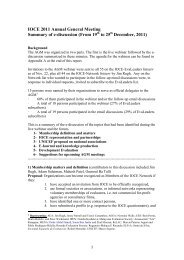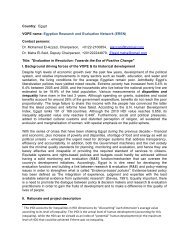18 Sandy Taut1994, p. 72), <strong>in</strong> hierarchical cultures it might be crucial for a successful evaluation to attend toone (the most powerful, not necessarily the most important) stakeholder group more thananother. Generally, <strong>in</strong> more conservative (as opposed to autonomous) cultures, it is desirable torefra<strong>in</strong> from actions that might disrupt the solidarity of the group or traditional order (seeSchwartz 1994a, <strong>in</strong>: Berry et al., 1997, Vol. 3, p. 99). In these cultures, political <strong>in</strong>fluences arelikely to be stronger than <strong>in</strong> more autonomous societies like the United States where people seekto express their op<strong>in</strong>ions (see Jang, 2000, p. 10, for South Korean example). In India, forexample, accord<strong>in</strong>g to Smith et al. (1994, p. 3), “the quality of one’s evaluation work is morelikely to be judged on political than on technical or professional grounds.”Propriety <strong>Standards</strong>Miller and colleagues (1990, <strong>in</strong>: Berry et al., 1997, Vol. 3, p. 24) argue that “[…]conceptions of morality vary across cultures: A justice-based notion of morality that emphasizesautonomy of the <strong>in</strong>dividual and <strong>in</strong>dividual rights […] is found predom<strong>in</strong>antly <strong>in</strong> <strong>in</strong>dividualisticcultural contexts.” This notion of morality (or propriety) relies upon impartial rules andstandards that are equally applicable to everybody. In contrast, <strong>in</strong> collectivist cultures “[…]morality constitutes a social practice that should be understood <strong>in</strong> terms of a duty-based<strong>in</strong>terpersonal code.” Lewy (1984, p. 379) also po<strong>in</strong>ts out the contextual dependency of ethicalcategories. Stufflebeam (1986, p. 4) notes that the Propriety <strong>Standards</strong> are “particularlyAmerican.” Russon & Patel (1999, p. 8) quote their African focus group participants consent<strong>in</strong>gthat the Propriety <strong>Standards</strong> portray “the greatest challenges” for transferability.<strong>The</strong>re is also a close connection between the Propriety <strong>Standards</strong> and the Hierarchy-Egalitarianism cultural dimension; egalitarian cultures stress the moral equality of <strong>in</strong>dividuals(Schwartz 1994a, <strong>in</strong>: Berry et al., 1997, Vol. 3, p. 63) while hierarchical societies emphasize thelegitimacy of <strong>in</strong>equality of <strong>in</strong>dividuals and groups. Jang (2000, p. 24) notes that <strong>in</strong>collectivist/hierarchical societies, ethical problems (as seen through Western eyes) might be“rationalized as be<strong>in</strong>g <strong>in</strong> the group’s best <strong>in</strong>terest.” In addition, there are high-context cultureswhich stress situational (context) <strong>in</strong>formation when judg<strong>in</strong>g behavior. In contrast, low-contextcultures, like the United States, refer more often to dispositional <strong>in</strong>formation, based on theassumption that traits have generality over time and situations (see Berry et al., 1997, Vol. 3, p.63). For all the reasons mentioned above, it generally seems difficult to transfer the Propriety<strong>Standards</strong> to collectivist/hierarchical/high-context cultures.P1 Service Orientation<strong>Evaluation</strong>s should be designed to assistorganizations to address and effectively serve the needs of the full range of targetedparticipants.Specifically, Standard P1, Service Orientation, calls for serv<strong>in</strong>g “program participants,community, and society” (Jo<strong>in</strong>t Committee, 1994, p. 83). In societies where there are largedifferences between <strong>in</strong>dividual/group status and goals (and where these differences areconsidered legitimate), this range of service delivery seems to be out of reach for the evaluator.Consumer rights, mirror<strong>in</strong>g service orientation and reflected by legislation, also vary across
Cross-Cultural Transferability of the <strong>Program</strong> <strong>Evaluation</strong> <strong>Standards</strong> 19cultures. North America is especially known all over the world for its service orientation.However, Standard P1 can be considered a universal goal for evaluators, even if not common <strong>in</strong>many cultures yet.P2 Formal AgreementsObligations of the formal parties to anevaluation (what is to be done, how, by whom, when) should be agreed to <strong>in</strong> writ<strong>in</strong>g,so that these parties are obligated to adhere to all conditions of the agreement orformally to renegotiate it.Smith et al. (1994, p. 10) po<strong>in</strong>t out the cultural differences <strong>in</strong> the way agreements arehandled. Formal agreements, especially as elaborated by Standard P2, Formal Agreements, arenot common practice <strong>in</strong> many cultures. For example, <strong>in</strong> India the power of formal agreements ismore limited than <strong>in</strong> the United States (see Smith et al., 1994, p. 10). Likewise, Jang (2000, p.18) observes that, for South Korea, memorandums and contracts <strong>in</strong> bus<strong>in</strong>ess sett<strong>in</strong>gs are lesscommon than <strong>in</strong> Western cultures. A contract might actually deteriorate the client-evaluatorrelationship because the client could perceive it as a sign of distrust toward him. This practicemight also be connected to communication style issues, i.e., the preference for <strong>in</strong>directcommunication might co<strong>in</strong>cide with a preference for <strong>in</strong>formal agreements.P3 Rights of Human Subjects<strong>Evaluation</strong>s should be designed andconducted to respect and protect the rights and welfare of human subjects.Standard P3, Rights of Human Subjects, is clearly based on U.S.-American legislation.As Chapman & Boothroyd (1988, p. 41) po<strong>in</strong>t out, American human rights laws “would neverpermit many practices <strong>in</strong> the United States that are common <strong>in</strong> evaluation studies <strong>in</strong> develop<strong>in</strong>gcountries.” Smith et al. (1994, p. 11) also mention cross-culturally different ideas of what harms<strong>in</strong>dividual rights. For example, <strong>in</strong> Malta and India, reputation and mental health “are notpossessed by the <strong>in</strong>dividual <strong>in</strong> the U.S. sense.” Differences <strong>in</strong> human rights legislation are alsonoted by Hendricks & Conner (1995, p. 85). African evaluators noted <strong>in</strong> a discussion of thisStandard’s transferability that, contrary to many Western cultures, <strong>in</strong> Africa “the rights of the<strong>in</strong>dividual are perhaps more often considered subord<strong>in</strong>ate to the greater good of the group” (p.9).P4 Human InteractionsEvaluators should respect human dignity andworth <strong>in</strong> their <strong>in</strong>teractions with other persons associated with an evaluation, so thatparticipants are not threatened or harmed.Standard P4, Human Interactions, states cross-culturally relevant goals for evaluatorsalthough the actual professional behavior might differ considerably between different culturalsett<strong>in</strong>gs, due to vary<strong>in</strong>g desirable <strong>in</strong>terpersonal <strong>in</strong>teraction patterns (for examples toward eldersand high status persons, see Smith et al., 1994, p. 11).
- Page 1 and 2: The Program Evaluation Standardsin
- Page 3 and 4: The editor acknowledges the valuabl
- Page 5 and 6: ForewordOn February 18-20, 2000, th
- Page 7 and 8: Hopefully, this volume will contrib
- Page 9 and 10: 5Cross-Cultural Transferabilityof T
- Page 11 and 12: Cross-Cultural Transferability of t
- Page 13 and 14: Cross-Cultural Transferability of t
- Page 15 and 16: Cross-Cultural Transferability of t
- Page 17 and 18: Cross-Cultural Transferability of t
- Page 19 and 20: Cross-Cultural Transferability of t
- Page 21: Cross-Cultural Transferability of t
- Page 25 and 26: Cross-Cultural Transferability of t
- Page 27 and 28: Cross-Cultural Transferability of t
- Page 29 and 30: Cross-Cultural Transferability of t
- Page 31: Cross-Cultural Transferability of t
- Page 34 and 35: 30 Nick L. Smith, Saviour Chircop a
- Page 36 and 37: 32 Nick L. Smith, Saviour Chircop a
- Page 38 and 39: 34 Nick L. Smith, Saviour Chircop a
- Page 40 and 41: 36 Nick L. Smith, Saviour Chircop a
- Page 42 and 43: 38 Nick L. Smith, Saviour Chircop a
- Page 44 and 45: 40 Nick L. Smith, Saviour Chircop a
- Page 46 and 47: 42 Soojung Jangyears. Due to the sc
- Page 48 and 49: 44 Soojung JangThis test-based sele
- Page 50 and 51: 46 Soojung JangTable 1. Descriptive
- Page 52 and 53: 48 Soojung JangU2 Evaluator Credibi
- Page 54 and 55: 50 Soojung Janggenerous to foreigne
- Page 56 and 57: 52 Soojung Jangfeelings. This partl
- Page 58 and 59: 54 Soojung JangReporting Informatio
- Page 60 and 61: 56 Soojung JangU4 Values Identifica
- Page 62 and 63: 58 Soojung JangReferencesBecker, C.
- Page 64 and 65: 60Standards for Evaluation:On the W
- Page 66 and 67: 62 Wolfgang BeywlThe advantage of t
- Page 68 and 69: 64 Wolfgang BeywlA more direct way
- Page 71 and 72: 67Evaluating Evaluations: Does the
- Page 73 and 74:
Evaluating Evaluations 69Bussmann 1
- Page 75 and 76:
Evaluating Evaluations 71• Housin
- Page 77 and 78:
Evaluating Evaluations 73Table 1: C
- Page 79 and 80:
Evaluating Evaluations 75• Contra
- Page 81 and 82:
Evaluating Evaluations 77References
- Page 83 and 84:
Evaluating Evaluations 79Raven, J.
- Page 85 and 86:
81Evaluation StandardsRecommended b
- Page 87 and 88:
Evaluation Standard Recommended by
- Page 89 and 90:
Evaluation Standard Recommended by
- Page 91 and 92:
Evaluation Standard Recommended by
- Page 93 and 94:
Evaluation Standard Recommended by
- Page 95 and 96:
Evaluation Standard Recommended by
- Page 97 and 98:
Evaluation Standard Recommended by
- Page 99 and 100:
Evaluation Standard Recommended by
- Page 101 and 102:
Evaluation Standard Recommended by
- Page 103 and 104:
Evaluation Standard Recommended by
- Page 105 and 106:
Evaluation Standard Recommended by
- Page 107 and 108:
103AnnexThe complete list of the or
- Page 109:
Annex 105A4 Defensible Information






